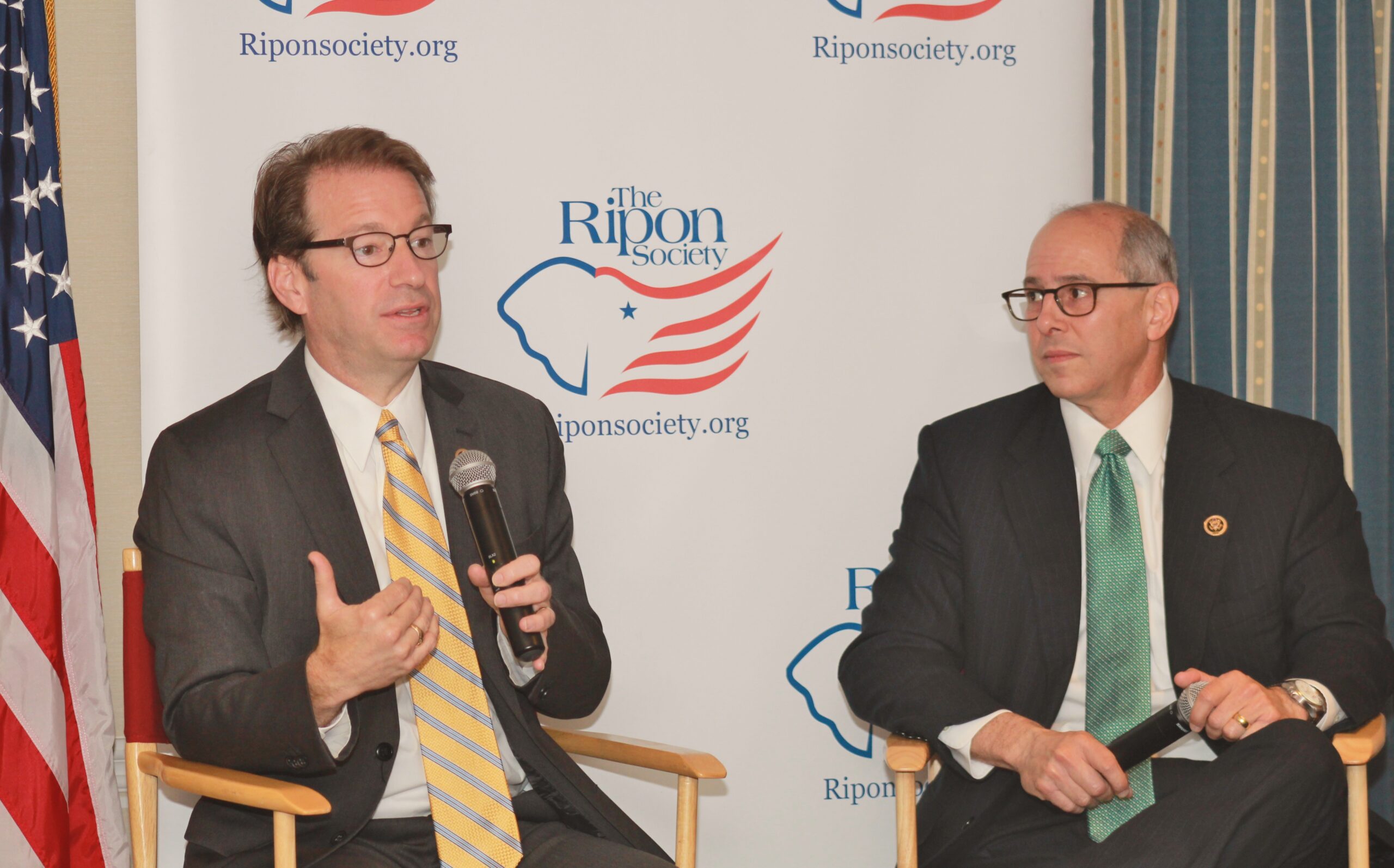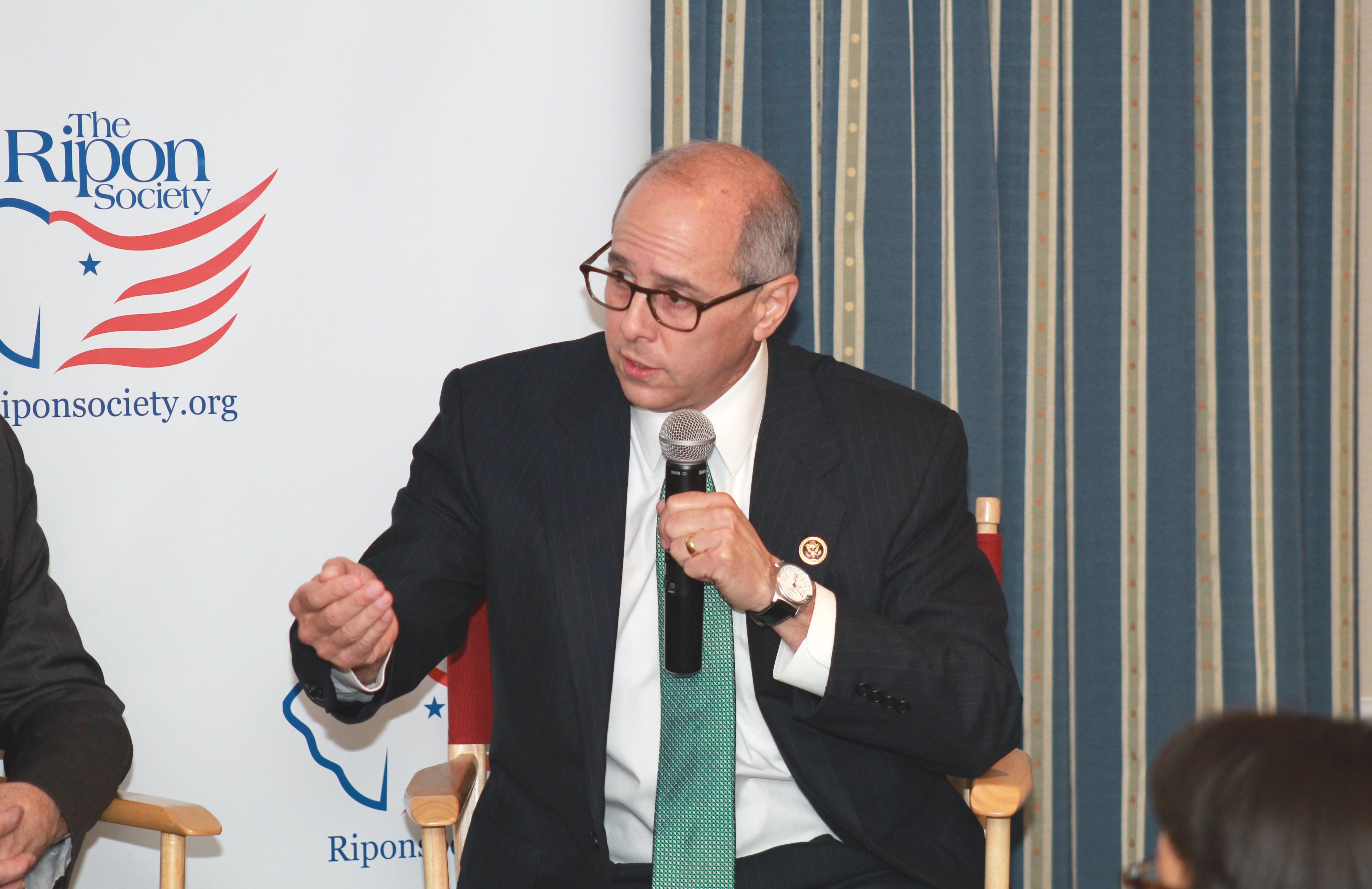 Subcommittee Chairs also discuss the importance of pending trade agreements
Subcommittee Chairs also discuss the importance of pending trade agreements
WASHINGTON, DC – Ways and Means Subcommittee Chairs Peter Roskam (IL-6) and Charles Boustany (LA-3) appeared at a breakfast meeting of The Ripon Society yesterday morning, delivering remarks in which they talked about the effort they are leading to reform the federal tax code and rein in the IRS.
Boustany serves as Chairman of the Human Resources Subcommittee of the Ways & Means Committee, while Roskam serves as Chair of the panel’s Subcommittee on Oversight. Both lawmakers are veterans of the chief tax-writing committee and have asserted themselves at the forefront of the tax reform discussion.
“We know we have the highest tax rate in the world at the statutory level,” Boustany remarked. “We also know that because of what has happened internationally – starting with the G20 countries initiating a base erosion and profit shifting project being managed by the OECD. This has created a chain reaction among countries that are now moving rapidly to put themselves in the best competitive position to attract intellectual property, research and development. For a U.S. company trying to operate in a very competitive global environment, being placed in a position of major tax disadvantage is just one more element that is hurting us in a serious way.
“The U.S. should lead the international discussion about tax policy. At the same time, we cannot sit still and wait for what is going to happen sometime this fall between September and December when the final report comes out. The countries in Europe are already rapidly making changes setting up innovation boxes and attempts to attract intellectual property, and the U.S. needs to do something. That is a compelling argument to move forward.”
Roskam shared insight into his panel’s aim to crack down on government “waste, fraud and abuse.” In doing so, he discussed a recent hearing that examined the practice of the federal government seizing bank accounts from those it suspects of illegal activity – without first having to charge them of a crime. Under current law, frequent deposits just under $10,000 can be deemed as “structuring” — that is, making deposits deliberately calculated to avoid reporting requirements. One testimony from this hearing was from Randy Sowers, the owner of a dairy farm and creamery in Maryland who was recently targeted by the IRS under this law resulting in more than $62,000 of seized assets.

“The law was designed to go after Walter White in Breaking Bad,” he explained. “It was not designed to go after Randy Sowers and his wife in rural Maryland, who are milking cows and doing nothing wrong. Yet the IRS comes in and seizes their assets. No notice, no phone call, no knock on the door – they seize their assets.”
“To make matters worse, the IRS refers this to the Department of Justice and they really put the hammer down on these people. The Department of Justice lawyer says to Mr. and Mrs. Sowers’ lawyer ‘we may make this a criminal referral, not a civil case.’ The lawyer writes back: “Why would you do that?” And the DOJ lawyer says ‘because your clients talked to the press.’ Now marinate in that for a second. The Department of Justice is jerking these people around because they are asserting their First Amendment right. That is abuse. If it’s systemic, that borders on tyranny. What we’re doing at the committee is going after that.”
Boustany was asked what a possible timetable for comprehensive tax reform might look like in the road ahead. In response, he noted the importance of having a tax reform package in time for the GOP Presidential nominee to embrace.

“We need to keep this discussion going, keep it alive, and dig further down into the technical details,” he declared. “We will figure out how far we can go politically. We need to set up a series of tests with the Administration to see what they’re willing to do. That is going to be a great limiting factor on getting a tax bill done. If the Administration won’t talk about anything, then this will wait until after the Presidential election.
“With the looming Presidential election, we’re working internally with the committee to get a draft of tax policy together that we can hopefully use as a comprehensive tax reform package so we can hand-deliver it to our nominee when the time comes. That way, you avoid the problem we saw in last Presidential campaign where you had a tax policy that was put out there, poll tested, but had a lot of holes in it. We need to have good policy and have our nominee embrace it with the likely prospect of tax reform for 2017 or shortly after that.”
Both legislators were asked how the business community could assist their efforts in promoting the importance international trade agreements.
“If the business community can change the culture within the business community and substantively engage further on down throughout the company so that an entire operation is articulating and advocating with its best interest in mind – that can be transformational,” Roskam stated. “We will get TPA done I predict, but we will need help on trade deals. We will need help on tax reform to break out of the zero-sum game and the squeamishness and uptightness I sense in all of these companies like ‘Hey, we don’t want to get into donkeys and elephants.’ I get that. Don’t get into donkeys and elephants, but articulate capitalist pro-market, pro-growth policies. I have seen a cavernous drop-off from what could be super, super influential to sort of a de minimis influence at the grassroots level.”
Boustany concurred.
“The business community is not doing a good job of selling trade, and this is a real problem,” he warned. “We’re getting beat really badly by the anti-trade elements that have a very organized grassroots effort in every single Congressional district. Every time a paycheck goes out, a percentage of that paycheck coming from international commerce should be shown – including every employee in every company that has anything to do with a supply chain or global commerce. Those employees need to know what percentage of their paycheck is coming from international commerce. That’s simple, and if we do that, we will never have a fight on trade policy again.”
The Ripon Society is a public policy organization that was founded in 1962 and takes its name from the town where the Republican Party was born in 1854 – Ripon, Wisconsin. One of the main goals of The Ripon Society is to promote the ideas and principles that have made America great and contributed to the GOP’s success. These ideas include keeping our nation secure, keeping taxes low and having a federal government that is smaller, smarter and more accountable to the people.



